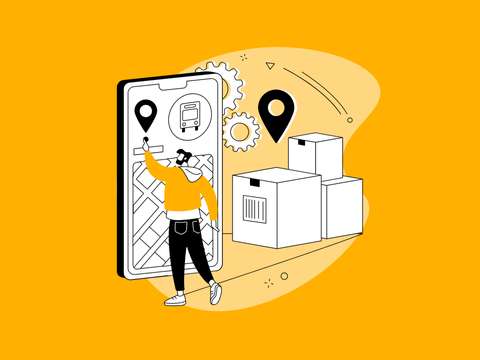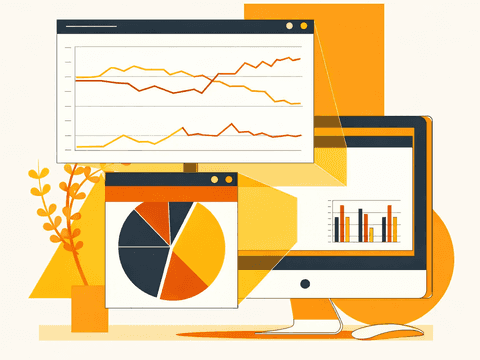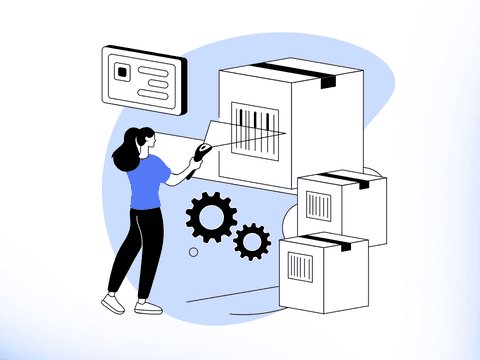Did you know that the right omnichannel eCommerce software can boost your sales, streamline fulfillment, and cut operational costs?
According to many reliable sources:
- 80% of consumers visit a retailer's website from their smartphone while shopping in-store, and 74% use a retailer’s app
- 66% of consumers expect companies to understand their unique needs, and 52% expect personalized offers
- 50% of consumers are more likely to buy from a brand that provides a seamless omnichannel experience
- 25% of shoppers expect real-time inventory visibility when browsing products online
Omnichannel isn’t optional anymore.
If you're selling through your website, marketplaces, social media, or physical stores, your customers expect a seamless shopping experience across all of them.
In the next article, we’ll explore the top omnichannel eCommerce software solutions that are trending and should be considered to future-proof your business and stay competitive.
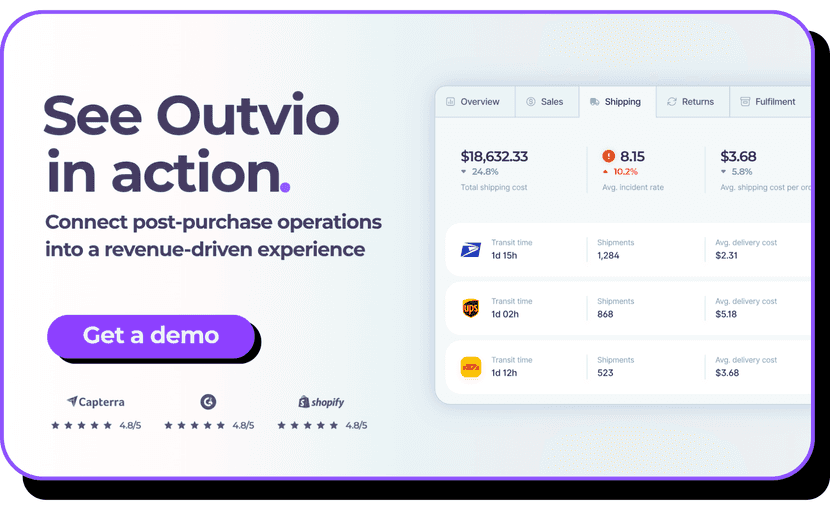
What is omnichannel in eCommerce
Omnichannel eCommerce is a comprehensive commerce strategy that integrates all sales, marketing, and customer interaction channels into a single, cohesive ecosystem.
Unlike traditional multichannel approaches, which treat each channel as separate, the omnichannel model unifies customer touchpoints, order management and fulfillment operations.
This allows customers to browse, purchase, return, and receive support across multiple channels without disruption.
What is an omnichannel software for eCommerce and retail?
An omnichannel eCommerce software is a comprehensive digital solution that connects all sales and communication channels allowing retail businesses to manage their entire commerce infrastructure from one system.
Beyond simply managing multiple channels, omnichannel software eliminates data silos, automates workflows, and optimizes operations by integrating with logistics providers, payment systems, CRMs, or ERPs.
Types of omnichannel tools for e-Commerce
- All-in-one. Easiest to use, fastest to integrate, and lowest cost. These are the most user-friendly tools, requiring minimal setup. Orders, tracking, support, and sales channels sync automatically
- Integration-based. Moderate complexity, longer integration time, and mid-range cost. These solutions connect with CRMs, ERPs, and third-party tools, requiring additional setup, customization, and ongoing management.
- Custom-built. Most complex, longest integration time, and highest cost. Built from the ground up, these systems offer full control over processes and data.
Best omnichannel eCommerce platforms and solutions
1. Outvio
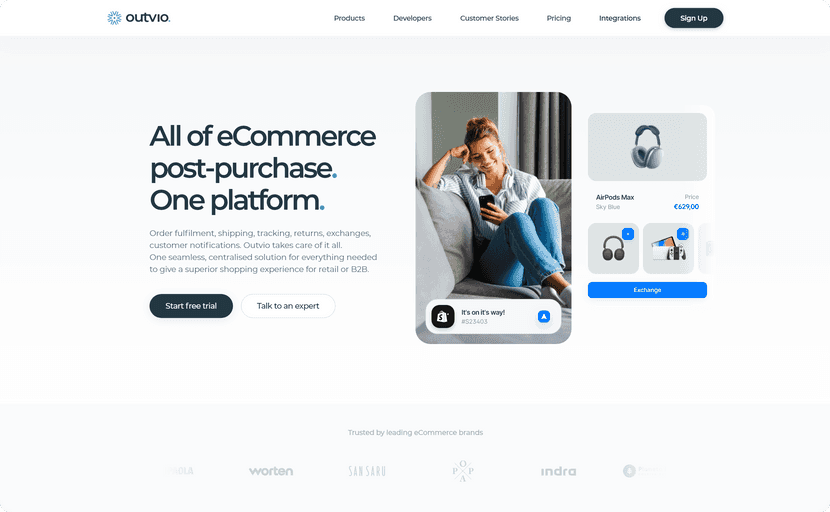
Ideal for: Complete automation of all eCommerce operations
Type: All-in-one
Outvio centralizes the most complex operations in eCommerce, such fulfillment, shipping, and customer interactions in a single platform. It integrates with multiple carriers, automates order imports from any sales channel for faster, error-free processing.
Its self-service return portal lets customers handle exchanges and refunds independently, while businesses can customize every interaction for a seamless experience and turn return requests into new sales.
Outvio also includes a built-in customer service system with automated responses, live chat, and voice integration, allowing eCommerce businesses to manage support efficiently across all channels.
2. Control Hippo
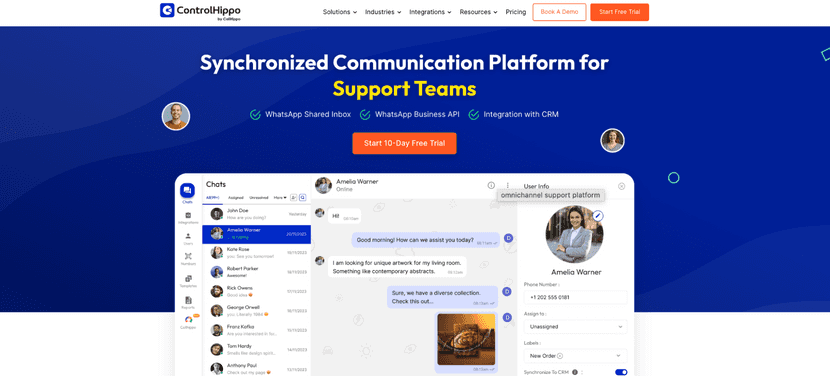
Ideal for: Customer communication and engagement
Type: Integration-based
URL: Control Hippo
Control Hippo centralizes customer conversations from email, live chat, social media, and messaging apps into a single platform.
It integrates with WhatsApp, Facebook Messenger, Instagram, and eCommerce platforms, allowing customer support and sales teams to respond faster, automate interactions, and improve customer experience.
3. Rithum
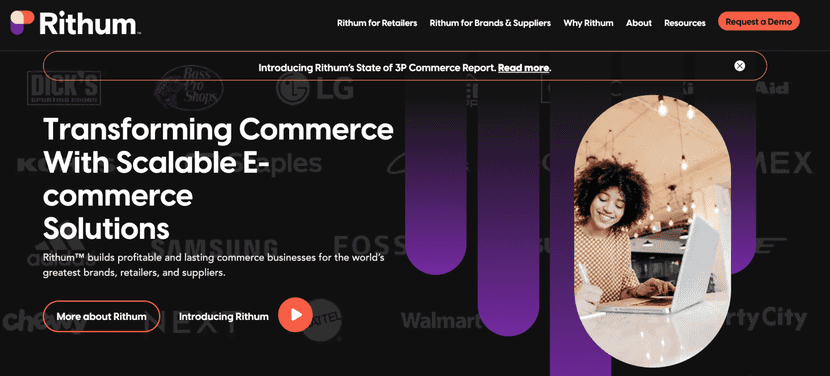
Ideal for: Marketplace automation and optimization
Type: Integration-based
URL: Rithum
If you're selling on Amazon, eBay, Walmart, or Google Shopping, Rhythm automates listings, pricing, and advertising so you can manage everything from one place.
No more manual updates—its AI adjusts pricing in real time and boosts product visibility to maximize your sales. Perfect if you want to scale effortlessly across multiple marketplaces.
4. Linnworks
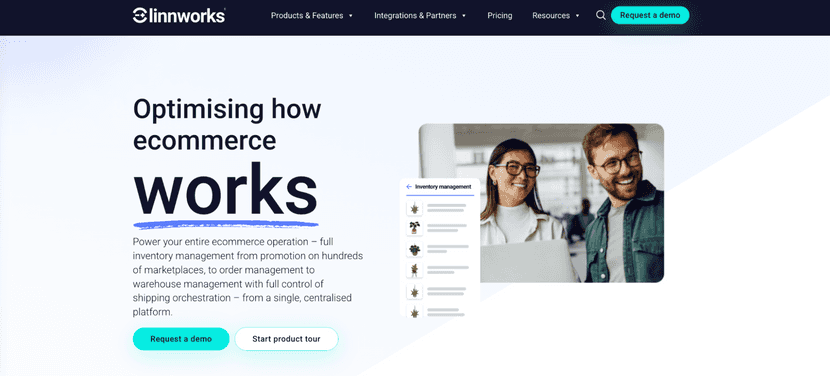
Ideal for: Inventory and order management
Type: Integration-based
URL: Linnworks
If you're handling high-volume sales, Linnworks syncs your inventory and orders in real time across multiple channels, preventing overselling and stock errors.
It connects with 100+ platforms and automates everything from order processing to shipping. Great if you need a system that eliminates manual work and keeps your stock in check.
5. Extensiv
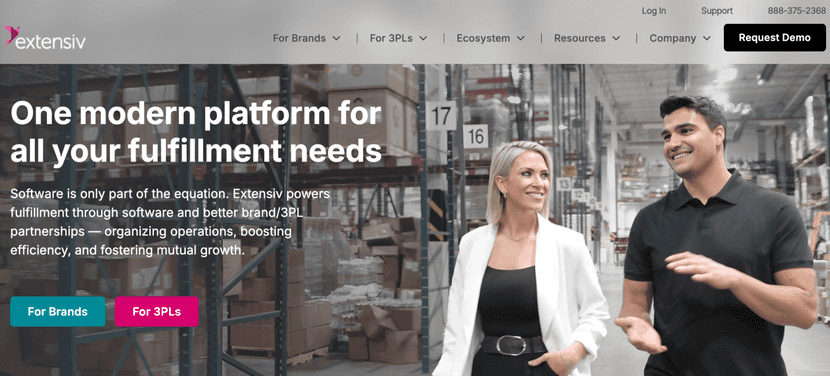
Ideal for: Fulfillment and demand forecasting
Type: Integration-based
URL: Extensiv
Extensiv isn't just another inventory tool—it uses AI to predict stock needs and optimize fulfillment based on past sales trends.
It integrates with Shopify, Amazon, Walmart, and third-party logistics (3PLs), making it ideal if you're looking to automate operations beyond simple inventory tracking.
6. Cin7
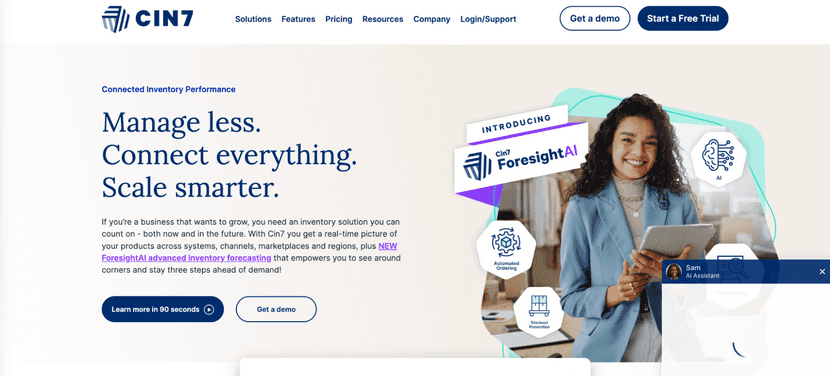
Ideal for: Inventory, POS, and supply chain management
Type: Integration-based
URL: Cin7
Cin7 is built for businesses selling online and in physical stores, giving you a unified inventory and order system across all channels.
It offers automated order routing, B2B capabilities, and real-time stock tracking, making it a strong choice for brands managing both direct-to-consumer (DTC) and wholesale sales.
7. Brightpearl
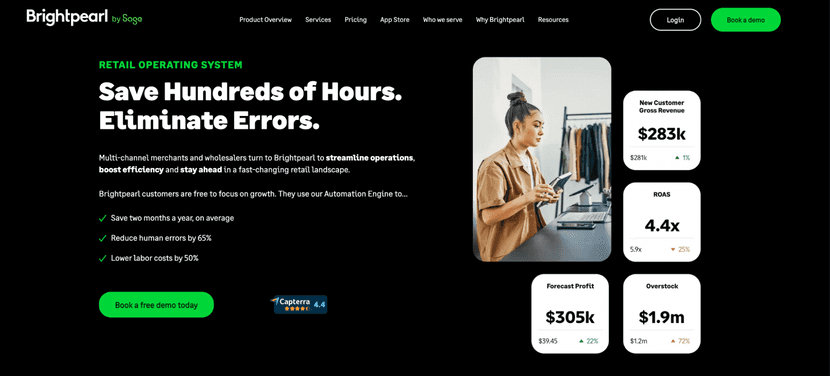
Ideal for: Financial automation
Type: Integration-based
URL: Brightpearl
If you're in retail and need a full ERP with automation, Brightpearl handles orders, inventory, and financials in one system.
It integrates with Amazon, eBay, Shopify, and Magento, streamlining operations while offering demand forecasting and built-in accounting tools. Best if you want an ERP without the complexity of traditional systems.
8. Sellercloud
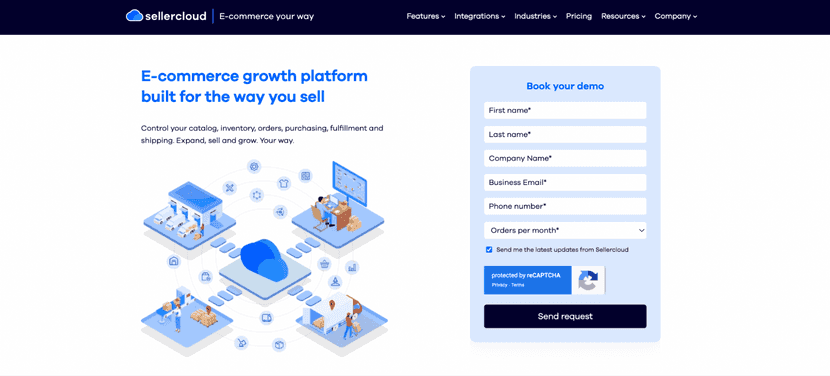
Ideal for: Multichannel selling and warehouse management
Type: Integration-based
URL: Sellercloud
Sellercloud centralizes your listings, inventory, orders, and fulfillment across multiple sales channels.
With 120+ integrations (Amazon, eBay, Walmart, Shopify, and more), it’s ideal for sellers managing their own warehouses, offering built-in warehouse management tools for tracking shipments, returns, and stock.
9. Netsuite ERP (Oracle)
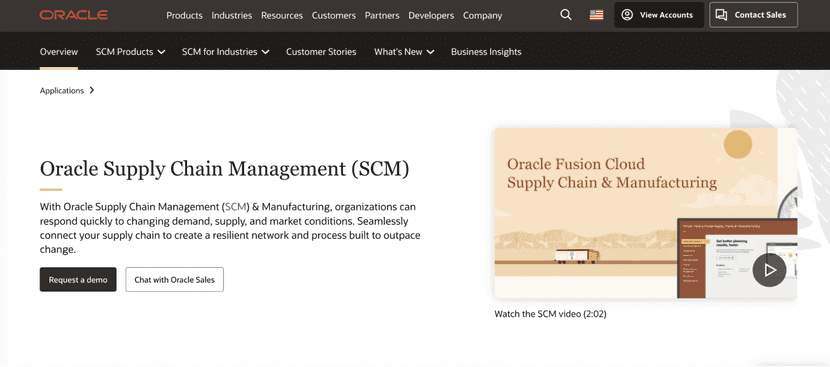
Ideal for: Enterprise ERP for eCommerce
Type: Custom-built
URL: Netsuite
NetSuite is an all-in-one ERP for large businesses, providing financial management, inventory tracking, and omnichannel commerce tools.
It connects with eCommerce platforms, marketplaces, and POS systems, offering real-time business intelligence and automation for finance, supply chain, and CRM functions.
10. SAP Commerce Cloud
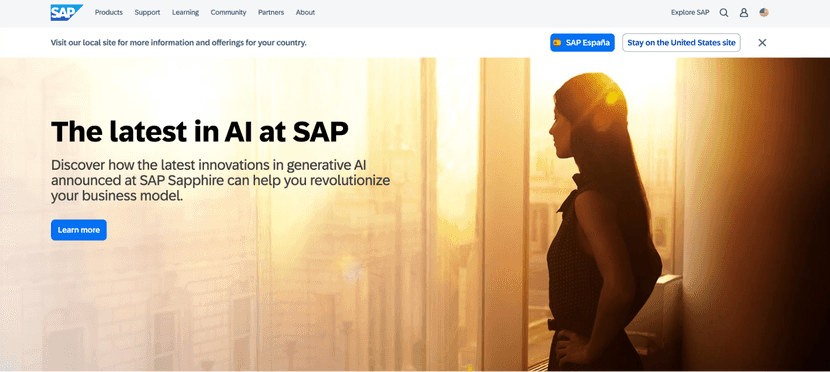
Ideal for: Scalable B2B and B2C Commerce Solution
Type: Custom-built
URL: SAP Commerce Cloud
SAP Commerce Cloud is for enterprises that need a flexible, scalable eCommerce platform for both B2B and B2C sales.
It includes customer segmentation, AI-driven recommendations, and personalized experiences, making it great for businesses that want to optimize their sales process across multiple channels.
How to choose the best omnichannel management platform
Multichannel vs. Partial Omnichannel vs. Full Omnichannel
Before choosing a platform, it's essential to understand the level of integration different software provides:
- Multichannel: Offers multiple customer contact points, but these channels operate independently. This can lead to repetitive communication and disconnected support.
- Partial Omnichannel: Unifies customer interactions into a single system, allowing agents to access a full conversation history and provide a seamless experience.
- Full Omnichannel: The most advanced solution, fully integrated with carriers for synchronized order management, enabling real-time tracking and automated customer support for shipping inquiries.
For businesses managing complex logistics and fulfillment, full omnichannel software like Outvio is the most efficient choice.
Consider your industry needs
Different industries require different solutions. For example, if your retail eCommerce business processes a high volume of returns, opt for a platform with an integrated returns portal to streamline the process.
Carrier integrations
If you want full order management, ensure the software automatically syncs tracking codes and shipping statuses with your logistics providers. Lack of carrier integration can lead to manual errors and delayed customer support responses.
Scalability for Future Growth
Your business will evolve, so the best omnichannel software should grow with you. Look for scalable solutions with flexible pricing plans and expansion capabilities, so you don’t outgrow the system as your operations scale.
Avoid software that relies on other solutions
A solution that depends on excessive third-party integrations can complicate fulfillment, slow down workflows, and create security risks in authentication.
Instead, opt for an all-in-one omnichannel platform that consolidates core functionalities like customer support, order tracking, and marketing automation.
Omnichannel eCommerce strategies and practical examples
1. Automate order fulfillment for speed & efficiency
Streamline order processing by automating shipping labels, invoices, and inventory syncing in real time. Use batch processing and smart warehouse routing to pack and ship efficiently, while priority fulfillment ensures VIP customers get faster service.
2. Centralize customer support across all channels
Customers switch between Instagram, email, and live chat, so all interactions should be unified in one system. Agents must have full order history access to avoid repetition, and smart routing should send urgent issues to the right department instantly.
3. Make returns effortless with self-service
Offer a self-service return portal so customers can generate return labels and track refunds without contacting supportirrespective of the channel where the application is made. Use dynamic return rules to speed up approvals for low-risk items while offering instant store credit to encourage an exchange instead of a return.
4. Sync shopping carts across all devices
Ensure customers can start shopping on mobile and finish on desktop or in-store without losing their cart. Use real-time syncing for carts, wishlists, and recently viewed items, and offer instant checkout via QR codes or customer support.
5. Make buy online, pick up in-store (BOPIS) instant
Use real-time inventory tracking to ensure only available items can be purchased for pickup. Set up a dedicated pickup counter for fast verification and automate shipping notifications with pickup instructions, offering curbside pickup where possible.
6. Keep pricing and discounts consistent everywhere
Ensure promotions apply online, in-store, and on mobile with omnichannel pricing tools. Train store associates to match online prices instantly without requiring manager approval to avoid customer frustration and lost sales.
How much does omnichannel ecommerce software cost? 2025 comparison
| Platform | Lowest Plan | Highest Plan | Free Trial | Details |
|---|---|---|---|---|
| Outvio | $125/month | $250/month | Yes | Includes unlimited tickets, agents, and voice calls |
| ControlHippo | $20/user/month | Custom pricing | Yes | - |
| Linnworks | Not specified | Not specified | Not specified | - |
| Cin7 | $349/month | $999/month | Yes | - |
| Brightpearl | Custom pricing | Custom pricing | Not specified | - |
| Sellercloud | $1,199/month | N/A | Not specified | - |
| Rithum | Custom | Custom | Not specified | - |
| Extensiv | $39/month | $199/month | Yes | - |
| NetSuite | Custom | Custom | Not specified | - |
| SAP | Custom | Custom | Not specified | - |
Conclusion
Choosing the right omnichannel eCommerce software makes your business run smoother and more efficiently. A well-integrated system keeps all customer interactions connected. Whether they shop online, visit a store, or contact support, they get a seamless experience without repeating themselves.
It’s not just about customer service. A strong omnichannel platform syncs carriers, speeds up fulfillment, and keeps pricing consistent. Automation removes manual work, reducing errors and saving time.
Customers expect a smooth shopping journey. The right software helps you meet those expectations, scale your business, and stay ahead of the competition.


